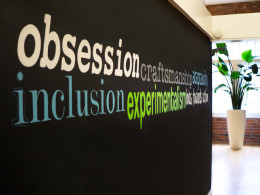
Maybe you’re a bit like me. When you’re nervous, say in an interview situation, you get quiet and reserved, and guard your words carefully to ensure you don’t say the wrong thing.
This is exactly what happened at my in-person interview here at Ivy Softworks. In an effort to impress my interviewers, I strived for perfectly formed thoughts about only the most ideal aspects of my career, expressed in the most eloquent language I could muster.
Where did this get me? Well, I very nearly didn’t get the gig.
What I didn’t realize at the time was that Ivy Softworks is not looking for perfect candidates. We’re looking for candidates who are (of course) very good at what they do, but who are also eager to adapt to new situations, can demonstrate a true affinity towards our core company values, and are able to learn from their mistakes and grow as a result. Rather than perfect candidates, we look for candidates with the perfect fit.
I’ll get back to how I overcame my nerves in a bit, but first I want to talk a little about our approach to interviewing candidates.
Interviewing for a job is a two-way conversation
Many people enter into a job interview with the mindset that they’re the only one on display. To an extent this is true, but keep in mind that this is the place and the people with whom you’ll be spending about half of your waking hours in a given week. You’ll need to be roughly as cool with the company as you are with your spouse, and conversely, your future co-workers will need to be roughly as cool with you as they are with their own spouses.
The interview is the time to mutually figure out if the fit is right.
At Ivy, we follow a rigorous multi-step process, with each step carefully engineered to help us understand key aspects of what makes a candidate tick — and to help the candidate decide for themselves if this is a place where they think they can succeed day in and day out. On top of that, we deliberately spread the interview across multiple days, because three hours is simply not enough time to properly assess for a decision that would undoubtedly have a major impact on any small team.
Throughout this process, we look for candidates who display the following core traits:
- Culture
- Capacity to Master
- Craft & Skills
Let’s take a look at each in turn.
Culture. If you’ve spent any time exploring our site, you already know how important this is to us. Specifically, we’re looking for candidates who authentically embody our values: Craftsmanship, Experimentalism, Inclusion, Obsession, Adaptability and Bias Towards Action. Check out our Team page for more details on how we think about these values.
Capacity for Mastery. Our industry is constantly evolving, and those who can’t evolve with it are unlikely to succeed in a fast-paced environment such as ours. We take care to surround ourselves with curious people who are constantly honing their skills. Those who display an ability to quickly pick up and internalize new technologies, concepts or skills are the most suited for startup environments, and thus primed for success here at Ivy Softworks.
Craft & Skills. This one’s easy — when you read the job description, are you actually reading a description of yourself? If so, and you have the resume, language and war stories to prove it, you’re well on your way to becoming one of us.
But remember: this is a two-way conversation. As candidates make their way through our interview process, we hope they’re asking themselves if they see us living up to our own values. Are we displaying evidence of our own culture, capacity to master and craft? Most importantly, can they see themselves being happy spending half their waking hours hanging out with us?
Tips for successfully interviewing at Ivy Softworks
So, back to my own interview. I had demonstrated evidence of my craft, had shown a strong capacity for mastery, and had given what I thought were some pretty good examples of what the company values meant to me.
But I still hadn’t sealed the deal. Why? In my effort to come off as the perfect candidate, I had left a good part of my personality out of the equation. After all, the point of the interview was to find mutual agreement that we all wanted to spend a whole lot of time together, and having left my personality at the door, the team was having a hard time envisioning what kind of person I would be on any given day.
Lucky for me, and in the spirit of their own transparency and authenticity, the team actually told me directly that they couldn’t discern much about the real me, and encouraged me to open up. With that feedback, I resolved to do the following:
Be authentic. The team wanted to get to know the actual me, not the “interview me”. Real people make mistakes, learn from them, and (usually!) come out a better person for them. As it turns out, I do make mistakes (okay, lots!) and the team wanted to know how I recover from them and improve my craft as a result. So I shelved the notion of presenting myself as unfailing, and dove head-first into some examples of failure and subsequent self-improvement.
Be enthusiastic. I wanted this job. I really, really wanted it, but the team had no idea because I was trying to stay calm and collected. This team loves their work, and looks for people who share that enthusiasm. So, I dropped my guard and said in unequivocal terms how excited I was about the possibility of joining the team. Because it was an authentic sentiment — expressed authentically — the team felt and believed it was true.
Don’t hold back. Turns out, not everything can be conveyed in a resume or portfolio. Those documents communicate the facts of your craft and career, but they do little to express why you do it. Once I dug a little deeper, beyond the bare facts of my own accomplishments, I was able to reveal the things that inspired me, the things that kept me up at night, and the things I still haven’t yet accomplished. These insights are invaluable to the team when trying to understand what motivates a candidate, and can be far more pertinent to evaluating fit than any job title they may have held years ago.
Ready to show us the real you?
The path to joining the team goes way beyond simply discussing your technical merits, it is about being your authentic self. Check out our open positions, think about what our approach means to you, and come prepared to show us what really makes you tick.
-
John Quarto-vonTivadar
-
Ivo Havener
